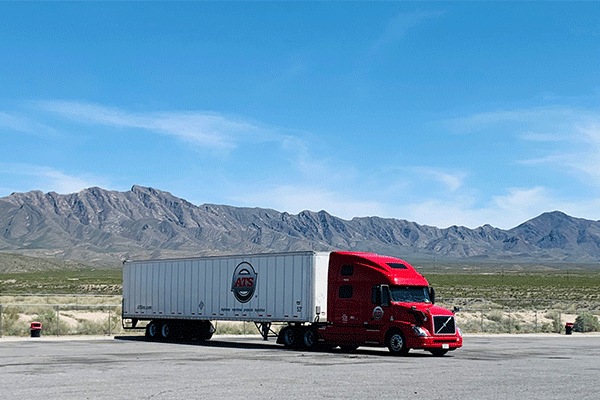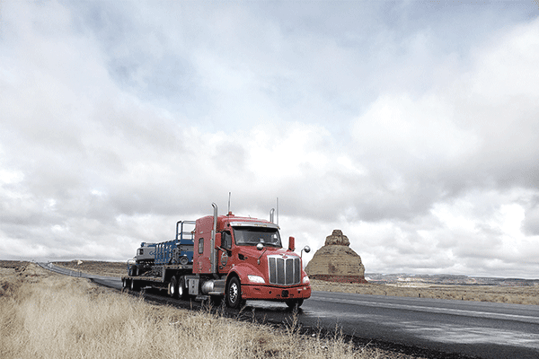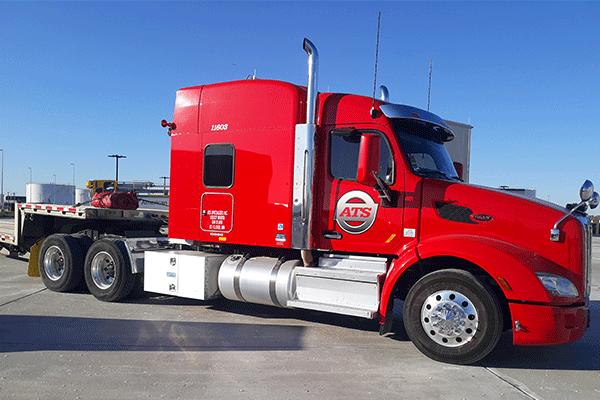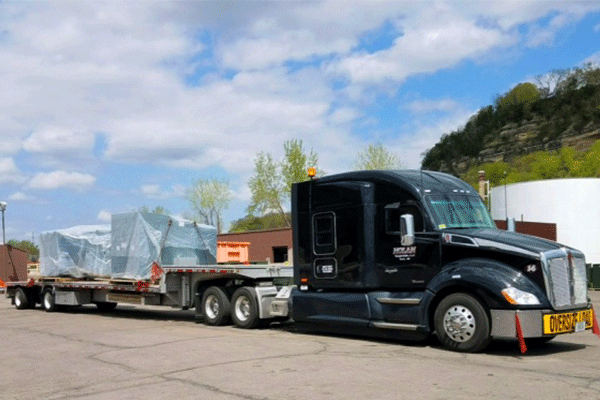Trailer-interchange agreements are another special piece of the transportation world. And, if you’ve ever wondered exactly what they do, when they should be used and how they relate to the shipping process, you’re in the right place.
Here at ATS, we’ve been operating as a transportation provider since 1955. During our long tenure in this industry, we’ve drafted, and participated in, our fair share of trailer-interchange agreements. As such, we firmly understand these documents and it’s time you did too.
Understanding shipping documents isn’t always easy. And, can often feel too complex to comprehend without a Juris Doctorate degree.
This is a ridiculous reality and it’s time to put an end to it. At the completion of this blog, you’ll walk away with a far better understanding of trailer-interchange agreements — without needing a law degree 😁 ! This includes:
- What they are
- What they should specify
- When they should be used
- How they differ from trailer rental agreements
So, put down your legal-jargon dictionary and take off your wing-tip shoes, you won’t be needing them today as we talk about all things “trailer-interchange agreements”.
What is a Trailer-Interchange Agreement?
A trailer-interchange agreement is a written contract constructed between two trucking companies. These agreements arrange for the consignment of a trailer from one carrier to another so that a shipment can be completed as planned.
The duration of these agreements varies based on the stipulated needs and requirements of each party. As such, trailer-interchange agreements often don’t have a general “expiration date”.
For instance:
If an ongoing interchange agreement is necessary because two trucking companies do business with each other frequently — as is the case with cross-border trucking providers in the United States and Mexico — interchange agreements can be made evergreen (last indefinitely).
In other instances, when a trailer is transferred less habitually — in one-off situations for example — trailer-interchange agreements can also be drafted to accommodate these situations.
As such, where applicable and when done correctly, trailer-interchange agreements provide a comfortable solution — in a variety of situations — for the carriers that utilize them.
Note: Although not always the case, trailer-interchange agreements are usually written by the party that owns the trailer in question.

What Do Trailer-Interchange Agreements Specify?
The core purpose of trailer-interchange agreements is to provide peace of mind to each party involved in these transfers. By signing these agreements, both of the trucking companies involved understand where their liabilities lie as it relates to the trailer in use.
When drafted correctly these agreements should leave no doubt as to which party is liable should an issue arise.
Many of this nation’s transportation providers don’t have the resources to employ an in-house legal department, which can make drafting a comprehensive interchange agreement difficult.
That said, these contracts are effective as long as they:
- Identify the contact information and role of each party involved.
- Explain the general terms of the agreement.
-
- Duration of contract
- Equipment type in use
- Destination of freight in transit
- What the trailer can be used for
- When and how the trailer should be returned
-
- (certifications needed, insurance required, necessary licensing, etc.).
5. Identify the limits of liability on each side.
-
- When is the party that owns the trailer responsible for damages?
- When is the party using the trailer responsible for damages?
- Who’s in charge of maintaining each trailer?
- Who’s responsible for keeping the motoring public safety when the trailer is under interchange?
On the whole, trailer-interchange agreements should make for a smooth transition of possession from one carrier to another. By highlighting the five sections above, these contracts can do just that.

When Are Trailer-Interchange Agreements Used?
In the trucking world, everything has a time and place. Similar to how a fresh scoop of sorbet (with a neatly placed mint leaf, of course) does wonders to cleanse the palate between courses, a trailer-interchange agreement adds value to truckers’ lives in unique ways.
These agreements are used most commonly in three situations:
- In situations where re-power services are necessary
- For through-trailer shipping between the U.S. and Mexico
- When power-only trucking services are used
1. In Situations Where Re-Power Services Are Necessary
Sometimes, things go wrong in the trucking industry. And, although truck drivers take great care to ensure the quality of their vehicles, it’s impossible to prevent all mechanical failures —be it under the hood or elsewhere— from happening.
A go-to solution in these situations — when a truck can’t be repaired in time to meet a delivery deadline — is what’s known as a “re-power”.
In a nutshell, “re-powering” a load is done by securing and substituting a second semi-tractor for the originally sourced — and now decommissioned — solution.
Trailer-interchange agreements are a vital piece of this process.
Often, carriers find a “re-power” solution by working with carriers outside of their company. Interchange agreements are needed to facilitate this relationship as these external transportation providers supply the tractor and employ the new driver but don’t own the trailer in transit.
Re-power solutions are usually one-offs and these agreements are drafted with shorter durations and specific instructions for returning the trailer (leaving it at the destination, bringing it back to the shipper, etc.).

2. For Through-Trailer Shipping Between the U.S. and Mexico
There are two methods for transporting freight, via truck, across the U.S.-Mexico border. These are through-trailer service and transloading (also called cross-docking) services. For through-trailer transportation, trailer-interchange agreements are integral.
On the whole, through-trailer services provide value to shippers by allowing freight to forgo any handling at border crossing points as it remains fixed to the same deck for the duration of its journey.
However, shipping freight across international lines is an intricate process. Often, as laws, jurisdictions and governmental regulations change from one country to another, so too does your cargo’s driver.
For shipments traveling into the heart of a foreign country employing through-trailer service means that three different drivers — one for each portion of its journey — transport freight:
Driver 1: Takes the trailer from its origin to the border.
Driver 2: Handles the transport of freight across the border.
Driver 3: Moves freight from the border to its destination.
Interchange agreements help to ensure that as the trailer changes hands, the party responsible for its care understands what's required of them, how the trailer may be used and any other pertinent information for its handling.
This helps to ensure that, should something go wrong and damage to the trailer occurs, the person/party responsible is truly held liable.
3. When Power-Only Trucking Services Are Used
Many shippers in the U.S. have a pool of trailers that they use to move cargo but don’t own any semi-tractors or employ any drivers. As a result, they only have half of the sandwich; the peanut butter without the jelly. And, as you know, they need to find some jelly. . .
This isn’t to say that these shippers should go out and purchase a fleet of trucks or add a handful of drivers to their payroll.
No, doing so would be a costly investment that shippers without the resources to make this work, avoid.
As such, shippers like this — who like utilizing their trailers and the loading-time convenience doing so provides — look for truck capacity in the form of “power-only” solutions.
Trailer-interchange agreements are an intimate part of power-only trucking as external drivers are charged with pulling another company's trailers for the duration of their journey.
To ensure that all expectations are understood, the truckers that provide “power-only” solutions must sign a trailer-interchange agreement before they hook to, and haul, any freight using a non-owned trailer asset.
Trailer-Interchange vs. Trailer Rental Agreements

The main differentiator between trailer-interchange and rental agreements comes down to money. Moolah. Cha-ching.
Sure, should damage occur, a trailer-interchange agreement may end up costing the carrier that’s liable. But, these fees are avoidable as long as each trucker takes care of the trailer they've borrowed.
Trailer rental agreements, on the other hand, are an entirely different story.
For the most part, rental agreements are signed when a trucking company needs to use a trailer for an extended period of time — be it to run their own freight or otherwise.
In these instances, carriers sign a trailer “lease” or “rental” agreement and pay the party that owns it a pre-negotiated rate to use their equipment for a pre-negotiated duration of time. None of these fees are attached to an interchange agreement.
Additionally, where a trailer interchange specifies how a trailer is supposed to be used, rental agreements aren’t usually so robust. Truckers that lease trailers from other carriers are able to use each trailer for their own for-profit purposes — provided they keep them properly maintained and make their payments.
What is Trailer-Interchange Coverage?
Trailer-interchange coverage is a form of insurance that should be held by all carriers that enter into an interchange agreement. This coverage protects truckers should damage to a trailer occur due to anything but negligence (fire, collision, vandalism, etc.).
Interchange agreements usually stipulate the requirement of this coverage. Since the drivers are utilizing a non-owned asset their commitment to acquiring this coverage goes a long way toward granting peace of mind to the company that owns them.
Round Out Your Transportation Industry Knowledge
Now that you have a better understanding of what trailer-interchange agreements are and the role they play in the transportation world, we invite you to continue your research into this industry.
On the whole, the transportation landscape is complex. With terms and acronyms you won’t hear anywhere else, enough documents to make your head spin and plenty of service offerings to write home about. The more you understand about the intricacies of this industry, the better off you’ll be to make the most of your time in it.
Here at ATS we pride ourselves on our knowledge of this world and using it to help others expand theirs. To do this, we publish content multiple times a week on our Learning Hub that you should definitely check out.
And, if you see something missing, make sure to reach out to us. We’re always happy to help you in any way we can.




